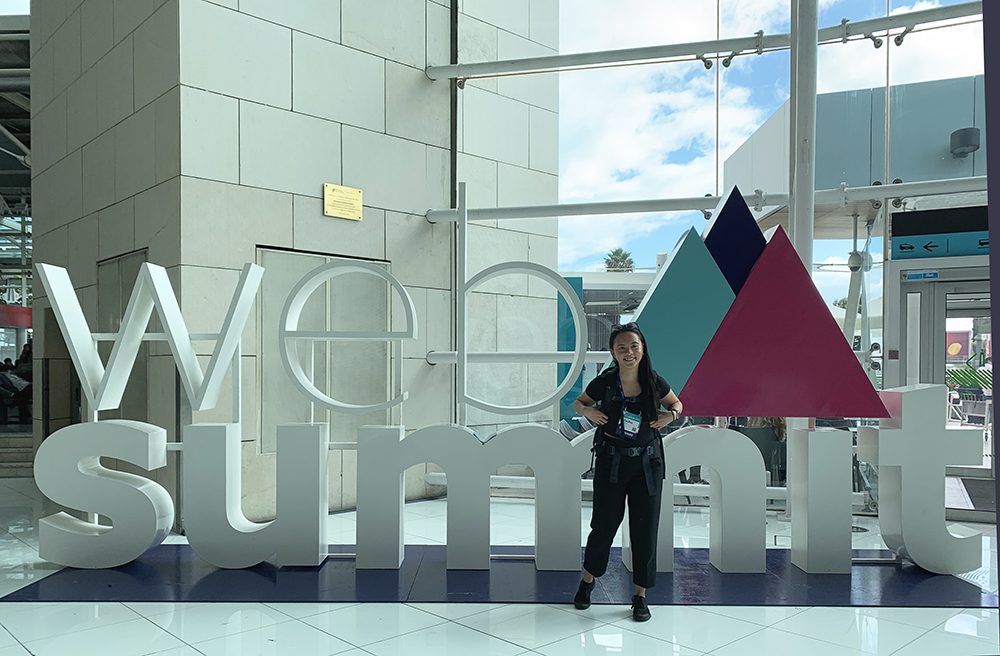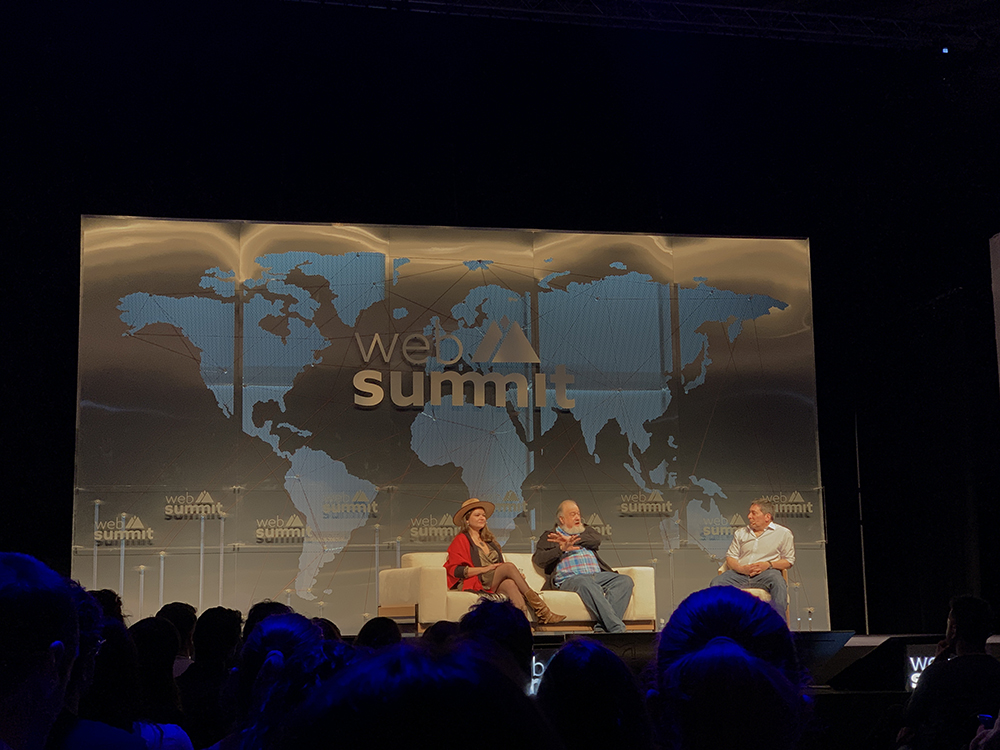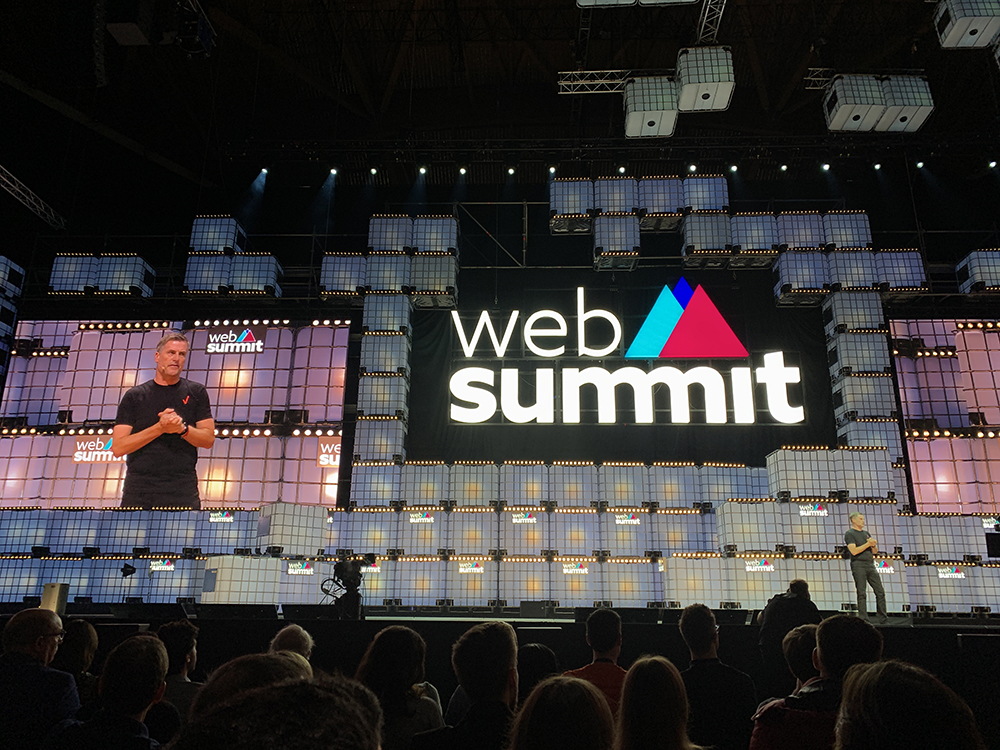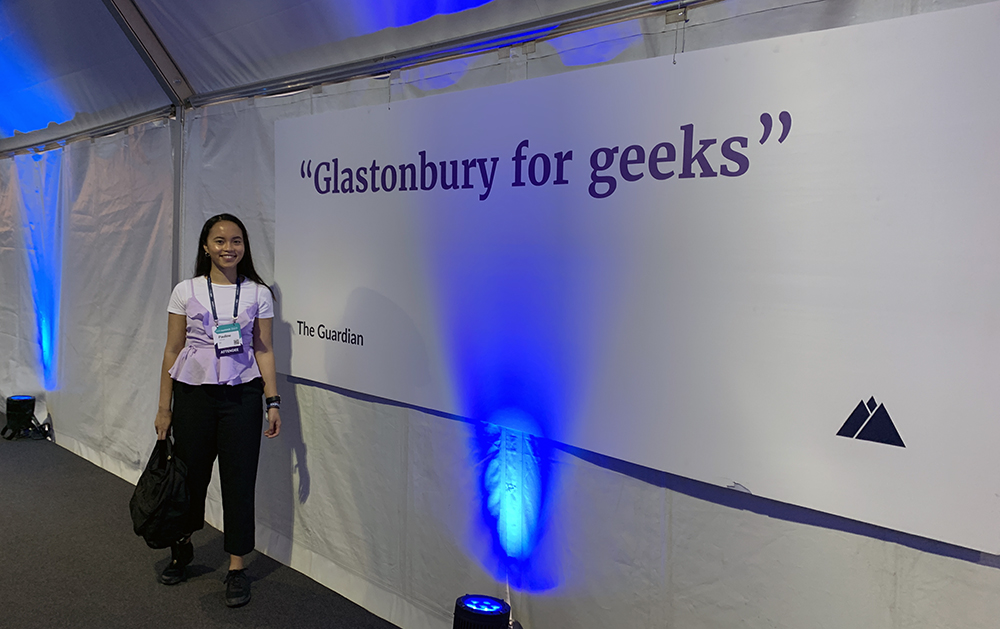I’m so excited to be writing this post! If you’ve been following me on social media, you’d know that I’ve been enthusiastically tweeting and sharing photos of my time at WebSummit — one of the largest tech conferences in the world. It took place in Lisbon, for the 5th year running and saw over 70,000 attendees from all over the world.
I had been wanting to go in the last 2 years, but always had something come up. I didn’t even have a ticket until about 3 months before the event so I didn’t think that I would make it this year. But Matt managed to snatch up a ticket, and that’s when my excitement started kicking in! I was finally going to go. 🤩

The 4 days of the conference was intense. This was my first international conference, and at this scale, it was honestly quite overwhelming to begin with. As the days went on, however, I got used to it! I learned so much about what is currently going on in the industry and also had the chance to hear some incredible ideas from some high potential start-ups.
Using the WebSummit app, you could plan your days. This included the talks and workshops that you can attend (there were loads to choose from across different ‘streams’ which were all different mini-conferences themselves) but also was a platform to chat to fellow attendees.

I initially planned to attend mostly developer and women in tech sessions, but as the days went on, I realised that I go to those types of talks all the time back in the UK. There was a chance to learn and hear from other people in the industry who have ideas I’ve not even heard of yet! I felt like I had a richer and more worthwhile experience as a whole than if I stuck to what was ‘comfortable’.
For the ease of this post, I’ve organised the talks into themes. Here’s some of my key takeaways from each:
Privacy and the internet 🔐
Opening Ceremony
Kicking off the Opening Ceremony was Edward Snowden live from Russia. Matt and I recently watched Citizen Four, a documentary about Edward Snowden and the NSA spying scandal. With Ed opening Web Summit, the theme of privacy and data was at the forefront of everyone’s conversations throughout the week.

This is me completely being honest…but I didn’t realise how my privacy and data mattered so much TO ME. Knowing that some of these tech giants were using my data for their own benefit – for the first time – scared me. As Ed shared his story and thoughts on data protection acts such as GDPR, I was blown away. It was one of those, “Oh.” moments.
Can anything be private anymore?
This session was held with Brittany Kaiser (Co-founder of Own Your Data Foundation), David Chaum (Founder and CEO of Elixir) and Joseph Menn (Tech projects reporter at Reuters)
The audience all voted no to this poll.
For those that don’t know, Cambridge Analytica Ltd was a British political consulting firm which combined data mining, data brokerage, and data analysis with strategic communication during the electoral processes. In 2018, Cambridge Analytica harvested people’s data from Facebook without consent for political advertising purposes. (Read more here, I also recommend watching “The Great Hack” on Netflix)
- People don’t realise how much data is collected about them, how much it is bought and circulated around the world
- We all have the right to have access to our data and to delete it
- GDPR is great for raising awareness, however, a fine is not enough. Brittnay advocates for criminalising data selling and holding of data.
- What should an average person do?
- Improve technical literacy. People need to know what their data rights are.
- Maybe delete Facebook.

The evolution of currency
This session was held by David Chaum (Founder and CEO of Elixir)
- What cryptography is: protecting information and communication through the use of codes so that only those for whom the information is intended can read and process
- Metadata is data that can be used to spy on people (showed a social graph that links up who sends messages to who)
- Demo on xxmessenger, a platform that mixes up this data so that no one can link up who you were talking to. End-to-end encryption isn’t enough!
- Elixir gives you the meta-level protection in a protected sphere
- The future: integration with payments
Looking back to go forward: 50 years of the internet
This session was held with Mitchell Baker (Co-founder of Mozilla), Mark Scott (Chief Technology of Politico) and Lee Rainie (Director of Pew Research Centre)
- Should we have a regulated internet? Do we need an FDA for algorithms? Is privacy only for the rich people to buy?
- Tech-lash (back-lash) as people are increasingly more aware of their privacy and data rights
- Other future trends: increase in loneliness, unhappiness and tech-lash
The future we build needs to be open
This session was held by Katherine Maher (CEO of Wikipedia)
The internet has shown us the value and the impact of the open movement – open web, open licenses, open source. How can we make this equal and accessible for all?
- Wikipedia has shown that knowledge is relevant. People are brought together by this need of knowledge. Wikipedia is currently one of the most trusted websites.
- We are currently in a crisis of trust, we must rediscover our humanity. What makes us human? Our ability to understand and share knowledge.
- Knowledge should be open, free and without restriction. Having knowledge together is great, no one of us has all the answers. Withholding information from each other is limiting.
Main take-home message: decentralisation of the web, currency, privacy
The environment and sustainability 🌱
Saving the planet, one drop at a time
This session was held with Jaden Smith (Co-founder of JUST water), Gary White (CEO of Water.og), Paul )’Callaghan (Founder of BlueTech Research) and Laurie Segal (Founder of Dot Dot Media)
- Discussions around the miscommunication of what is going on in our planet
- How each of the panelist got to where they are today. Jaden Smith’s story was inspiring, he had said that since he was younger, he’d realised how lucky he was and how he wanted to help others.
- All of these organisations are helping with the communication on water

Are you ready for 5G?
This session was held with Ronan Dunne (CEO of Verizon)
- One of the 8 currencies 5G promises is improving energy efficiency (compared to 4G)
- The 4th industrial revolution promises to reverse the damage of the other revolutions before us.
- Tech industries have a huge role to play in the environment, Ronan believes 5G can help with that.
Main take-home message: There were other talks going on the environment that I didn’t have the chance to go to, but they touched on things like fast fashion and sustainability. The sessions I did go to however, made me more mindful on my impact on the environment. WebSummit also worked on creating a greener event by allowing attendees refill their bottle (this was not something that they did last year) They also have been promoting an approach to sustainable fashion (with Paddy’s infamous jumper) and recycling bins dotted around the venue.
The future of technology – automation, robots and MedTech 🤖
Robots are dead, long live robots
This session was held with David Hanson (Founder, Hanson Robotics Ltd), Sophia the Robot (Hanson Robotics Ltd), Ben Goertzel (SingularityNET) and Philip K. Dick the Robot (Hanson Robotics Ltd)
This was by far the most mind-blowing session ever. I first saw Sophia the Robot on an episode of Silicon Valley and was impressed then, but seeing her in real-life interacting with her brother, Philip for the first time was quite something! David and Ben talked through the future of living and working alongside these robots, and how AI is gradually getting better and better. It wouldn’t be uncommon to see robots on our streets in the future.
Amazon.ai
This session was held with Werner Vogels (CTO, Amazon)
- Machine learning has never been more important to Amazon – it is the powerhouse!
- Deep learning has a 15x improvement accuracy
- Machine learning has enabled:
- Forecasting – offering purchases customers will most likely buy based on their history. Neural networks help make this better.
- Buying – sourcing the goods at a particular location
- Placement – looking at where you place the goods
- Customer promise – fulfilling this
- Amazon looking at using drones to speed up good delivery – but safety is the most important part in this
- Machine learning should be put in the hands of everyone, not just data scientists. AWS has training on this!

How to build on AWS without knowing much about AWS
This developer workshop was held with the AWS team
- Most of the information here was pretty much what I’ve been learning through AWS Newbies and A Cloud Guru 😊
- Felt good knowing I understand what was being talked about
A disease free world, for everyone?
This session was held with Trevor Martin (Mammoth Biosciences), Amir Barsoum (Vezeeta), Alex Deane (FTI Consulting Strategic Communications)
- If we can eradicate disease, we should. But there is the question around the production of “superbugs” or “super disease”!
- Already seeing progress with gene-editing to help eradicate some genetic disorders
- Will tech remove health inequality?
- AI will help remove doctor burden and more tech like this dotted around the world can be transformative to others.
- The more health tech we have, the more we can drive the cost down in the developing world.
- AI can help with data sorting
- AI/ML will make jobs in the field different
- We already see tech giants such as Amazon and Apple make their way through the health world. This is positive as health is not just an isolated industry, more multidisciplinary work can lead to innovation.
Health in space: the final frontier
This session was held with Scott Solomon (Rice University), Marianne Brandon (Wellminds Wellbodies LLC), Ian Robertson (Trinity College Dublin) and Paul Nuki (The Daily Telegraph)
Discussion around:
- What will happen when/if we live in space? Can we survive long-term?
- What is the impact of the long-term exposure to radiation to our DNA? Can this be passed on? If we reproduce in space, will bringing up kids in space be a healthy thing?
- Creating shields that can help with exposure to radiation
Neurealms of brain tech
This session was held with Ali Rezai (Rockefeller Neuroscience Institute), Thomas Reardon (CTRL-Labs) and Katie Collins (CNET)
- The focus on neuroscience at the moment is very academic – how can we approach it differently? Gain funding not on pathology but also the entrepreneurship and learning.
- Should we use tech to make super brains?
- One argument – no, we should focus on disease sufferers.
- Another argument – there is a lot more humans can do apart from using tech on their phones. We should level up as humans, make the most of cognitive enhancements if possible. Maximise our humanity.
- Demo on CTRL-Labs – using motor neurone and brainwaves to control arms / hands.
24/7 healthcare is here
This session was held with Gary Mudie (CPO, Babylon Health) and Joao Tome (Technology Correspondent, Dinheiro Vivo)
- Using the Babylon app, you are able to get digital consultation and reach doctors wherever and whenever you need it.
- You are also able to see the closest pharmacy or get medication delivered to your door
- AI and chatbots can help chat to people, helping them with symptoms and if serious/needed, send them to the right place.
- Taking a digital-first approach to help improve accessibility to health
Main take-home messages: 🤯🤯
The future of technology – 5G and the internet 🕸
5G+X: Creating a new era
This session was held with Gu Ping (CEO of Huawei)
- An incredible upgrade to communications infrastructure
- But what makes it truly remarkable is the software built on top, this can generate true value
- Huawei is enabling app development to fully unleash their potential by opening up the Huawei developer programme that aims to help advance developments in technology. There will be 21 open labs across the world!

Are you ready for 5G?
This session was held with Ronan Dunne (CEO of Verizon)
- 5G is not simply another ‘G’. It is 10x technology that is transformative.
- 5G has an important part to play in the upcoming 4th industrial revolution (4IR) that includes VR, AR, IoT, AI and automation.
- The 5G currencies include:
- High speed
- Robust data
- Improved latency
- Able to connect 10x devices (to achieve the true IoT)
- Able to keep up on high-speed trains
- Reliability
- Energy efficient
How space-based networks will bring internet to the world
This session was held with Adrian Steckel (CEO of OneWeb) and Kit Eaton (Tech Writer)
- OneWeb are on a mission to bring a space-based network to allow access to the internet across the whole globe
- Satellites will offer internet – there will be no trace in space
- Working with government bodies with things like policies e.g. in China
- This will allow those who have no access to internet, the ability to connect e.g. schools and those in parts of the world that are still not connected
Main take-home message: 🤯
Nutrition is still confusing 🍏
All meat, no meat, are we really what we eat?
This session was held with Steven Gundry (The Plant Paradox), Mikhaila Peterson (The Lion Diet), Saeju Jeong (CEO, Boom) and Alyssa Newcomb (Business and technology Contributor, NBC)
- Three stances on preferred diets on stage: Plant-based, All-meat (Keto) and no sponsored diet
- Key thoughts:
- Eat for your microbiome, the more diversity the better
- Figure out what you like and what your body reacts to.
- The environment argument on vegan/vegetarianism – is it all propaganda? This was an interesting debate to listen to!
- Intermittent fasting is the healthiest thing to do, you shouldn’t be eating all the time.
- All in all – do whatever works for you and your body

Main take-home message: Do whatever makes your body feel good.
Working in technology 💻
Setting company values
This session was held with Gillian Tans (Chairwoman of Booking.com), Simon Segars (CEO of Arm Inc.), Adaire Fox-Martin (SAP Executive Board) and Mark Scott (Chief Technology of Politico)
- What are your company values? Are these communicated well within the company? Are there examples of people in the business that demonstrate these values?
- Values are constantly changing. You can’t create values all by yourselves (in a business), CEOs and higher ups need to listen to their people. There needs to be a united structure of values.
- Also remember that employees bring in their own values to work.
- For a company to be successful, employees need to believe in the values.
- If diversity for example is one of your key values, you have to showcase it. More show than passive conversations.
Lisbon and the world
This session was held with John Graham-Cumming (CTO of Cloudflare) and Mariana Barbosa (ECO)
- When thinking of ‘socials’ – don’t forget to be inclusive. It isn’t just beers on a Friday.
- The impact of early talent – graduates are important and can bring in a lot of innovation into the company
- When re-locating or creating new offices across the world, it is important to ask yourself, “what is the quality of life like there?” Employees’ lives are as important as how well your business is doing.
How do we overcome the gender gap?
This session was held with Sue Allchurch (Chief Outreach and Engagement, UN), Paige VanZant (Fighter UFC), Michelle Fang (Chief Legal Officer, Turo) and Dima Khatib (Managing director, AJ+)
- We should be mindful that it isn’t just the gender gap – people of colour, LGBT+, disabilities
- There was a discussion around diversity quotas – should we have them?
- One argument: if we do this, will there be unqualified people hired?
- Another: It isn’t going to change without quotas. There are plenty of talented people from these communities that can learn and adapt.
- Strong female role models are important. Stories were shared around having women in higher roles help to see that there is room for them.
- Mentoring should include men and women.
- Female solidarity – are women helping each other as much as they can? Is this the era of sisterhood rather than competition?
Main take-home message: Graduates rock (seen this first hand 😉), supporting each other is how we all advance our careers (instead of competing or trying to drag each other down), if you’re in a position to help, do it, values are important at work.
Content Maker 🎨
How to win fans and influence people
This session was with Caspar Lee (Co-founder, Influencer.com), Jessica Ennis-Hill (Founder of Jennis Fitness), Ian Somerhalder (Actor) and Laurie Segall (CEO of Dot Dot Media)
- Above everything else, authenticity is key to winning fans and influencing people. The trust has to be there.
- Build a connection with brands and others
- Should the word ‘influencer’ still be used? Are there any other alternatives? Influencers now have a more negative connotation. Caspar suggested, ‘creator’.
- Instagram potentially removing likes on its platform is seen as a positive thing across the board. This can help with mental health and promote communities rather than competition between people.
- When social media makes you feel bad, what should you do?
- Understand the bigger picture -> it literally is just Instagram
- Take some time off social media – Jess shared that she did this during her competitions to help her focus because she knew that even one negative comment had a bad affect on her.
- Breathe and walk away – Caspar shared that eventually you build a thicker skin
- If something makes you feel bad, just unfollow.
- Don’t focus on the numbers – enjoy what you share and create, it will grow and shows over time!
The power of influence
This session was with Caspar Lee, Ben Jeffries (CEO and Co-founder of Influencer.com) and Ali Aydin (Deputy Digital Editor-in-Chief of Euronews)
- Is the era of the influencer coming to an end or are we more in thrall with the lives of social media stars than ever before?
- It is increasingly obvious to people who are buying followers.
- There is a mix of bad and good influencers. influencer.com helps you connect with influencers that suit your products, as people trust social media less and less, platforms like these are becoming vital.
- Only endorse products that you believe in. Is there responsibility around this? Yes!
- Earning money as an influencer – through various streams including ads and promoting products.
- Being transparent about this – important!
Main take-home message: Be you, boo.
“Glastonbury for geeks” 🤓
After each talk, I was quite honestly mind-blown. I was pretty much this emoji, the whole way through: 🤯
WebSummit is described as “Glastonbury for geeks” and “The Olympics for geeks” which couldn’t have been more accurate. I left feeling exhausted but also so much more aware of what is going on in our industry. Matt said something that made me laugh but is also 100% true, “WebSummit is to get us woke.” Woke, indeed!

I’m excited for next year’s edition already (or even maybe their North American conference 👀) It’s been a blast, and for me and my personal development very rewarding! Thank you to the whole WebSummit crew for putting this together and for Portgual for being long-term supporters of the event. 🙏🏻 Until next year!

Leave a Reply